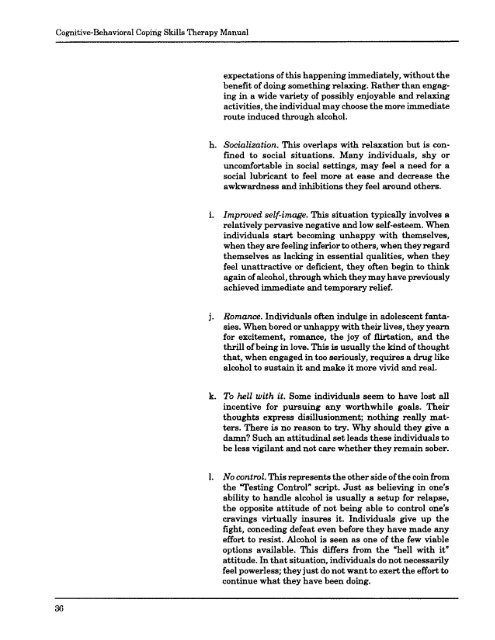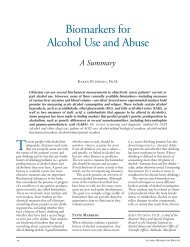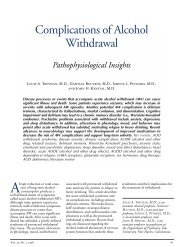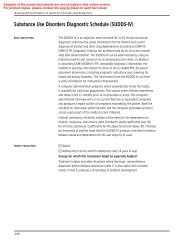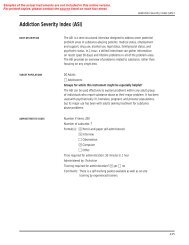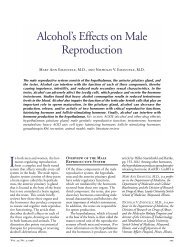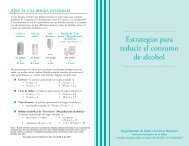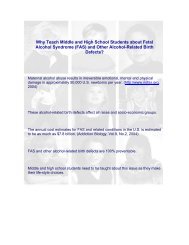Project MATCH Volume 3 - The NIH Portal is undergoing required ...
Project MATCH Volume 3 - The NIH Portal is undergoing required ...
Project MATCH Volume 3 - The NIH Portal is undergoing required ...
Create successful ePaper yourself
Turn your PDF publications into a flip-book with our unique Google optimized e-Paper software.
Cognitive-Behavioral Coping Skills <strong>The</strong>rapy Manual<br />
expectations of th<strong>is</strong> happening immediately, without the<br />
benefit of doing something relaxing. Rather than engag-<br />
ing in a wide variety of possibly enjoyable and relaxing<br />
activities, the individual may choose the more immediate<br />
route induced through alcohol.<br />
Socialization. Th<strong>is</strong> overlaps with relaxation but <strong>is</strong> con-<br />
fined to social situations. Many individuals, shy or<br />
uncomfortable in social settings, may feel a need for a<br />
social lubricant to feel more at ease and decrease the<br />
awkwardness and inhibitions they feel around others.<br />
Improved self-image. Th<strong>is</strong> situation typically involves a<br />
relatively pervasive negative and low self-esteem. When<br />
individuals start becoming unhappy with themselves,<br />
when they are feeling inferior toothers, when they regard<br />
themselves as lacking in essential qualities, when they<br />
feel unattractive or deficient, they often begin to think<br />
again of alcohol, through which they may have previously<br />
achieved immediate and temporary relief.<br />
Romance. Individuals often indulge in adolescent fanta-<br />
sies. When bored or unhappy with their lives, they yearn<br />
for excitement, romance, the joy of flirtation, and the<br />
thrill of being in love. Th<strong>is</strong> <strong>is</strong> usually the kind of thought<br />
that, when engaged in too seriously, requires a drug like<br />
alcohol to sustain it and make it more vivid and real.<br />
To hell with it. Some individuals seem to have lost all<br />
incentive for pursuing any worthwhile goals. <strong>The</strong>ir<br />
thoughts express d<strong>is</strong>illusionment; nothing really mat-<br />
ters. <strong>The</strong>re <strong>is</strong> no reason to try. Why should they give a<br />
damn? Such an attitudinal set leads these individuals to<br />
be less vigilant and not care whether they remain sober.<br />
No control. Th<strong>is</strong> represents the other side of the coin from<br />
the "Testing Control" script. Just as believing in one's<br />
ability to handle alcohol <strong>is</strong> usually a setup for relapse,<br />
the opposite attitude of not being able to control one's<br />
cravings virtually insures it. Individuals give up the<br />
fight, conceding defeat even before they have made any<br />
effort to res<strong>is</strong>t. Alcohol <strong>is</strong> seen as one of the few viable<br />
options available. Th<strong>is</strong> differs from the "hell with it"<br />
attitude. In that situation, individuals do not necessarily<br />
feel powerless; they just do not want to exert the effort to<br />
continue what they have been doing.


